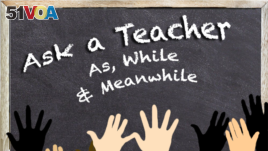30 July 2021
This week on Ask a Teacher, we answer a question from Carmen in Mexico. She asks:
Question:

What are the differences between "as," "while" and "meanwhile"? Thanks for your help. Greetings from México.
Answer:
Hi Carmen! All three words inform us that two things are happening at the same time. Any of them can be used in place of the other when you want to express that idea. But, if you are ever unsure which one to use, choose "while."
While and as
We can use the word "while" or "as" to connect two actions or situations that happen at the same time. Listen to the examples:
While I was crossing the street, the traffic light turned red.
As I was crossing the street, the traffic light turned red.
But "while" is more common. "As" can sometimes sound formal – or even literary.
Notice that the structure of the two sentence examples is the same. Only one word changes.
You can also put "as" or "while" in the middle of a sentence. For example, you can say, "The traffic light turned red as I was crossing the street."
Meanwhile
Now, let's talk about "meanwhile," which means "at or during the same time."
When we use "meanwhile," our sentence structure changes. Listen to how the speaker uses it:
I was crossing the street. Meanwhile, the traffic light turned red.
Here, you have two separate sentences describing what two things happened. "Meanwhile" comes at the start of the second sentence.
American English speakers generally use "meanwhile" when we are telling a lively or funny story about someone or something. For example, American comedian Stephen Colbert uses the word on his late-night television show to recount unusual news events.
Real journalists also use "meanwhile" in their reports. In news, it often signals a sudden change in a story's direction.
And finally, note that all three words have other meanings that they do not share.
That's Ask a Teacher for this week.
I'm Alice Bryant.
Alice Bryant wrote this lesson for Learning English. Caty Weaver was the editor.
_______________________________________________________________
Words in This Story
formal – adj. suitable for serious or official speech and writing
literary – adj. of or relating to literature
comedian – n. a performer of humor